William_Blake_the chimney sweeper 译文及解析
The Chimney-Sweeper
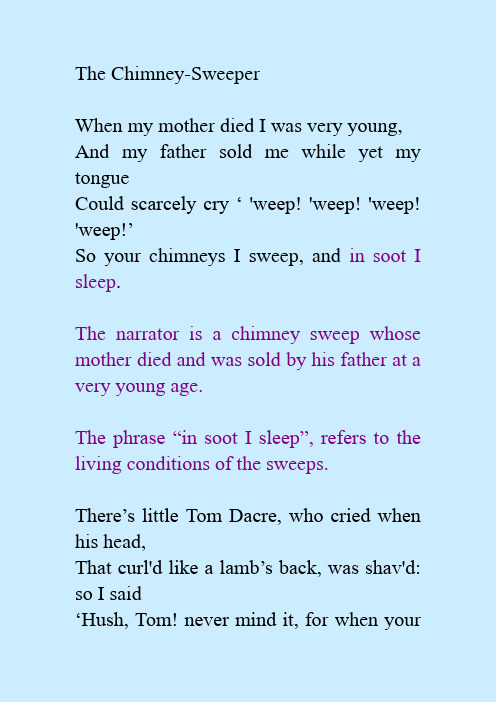
The Chimney-SweeperWhen my mother died I was very young, And my father sold me while yet my tongueCould scarcely cry … 'weep! 'weep! 'weep! 'weep!‟So your chimneys I sweep, and in soot I sleep.The narrator is a chimney sweep whose mother died and was sold by his father at a very young age.The phrase “in soot I sleep”, refers to the living conditions of the sweeps.There‟s little Tom Dacre, who cried when his head,That curl'd like a lamb‟s back, was shav'd: so I said…Hush, Tom! never mind it, fo r when yourhead‟s bareYou know that the soot cannot spoil your white hair.‟And so he was quiet, and that very night, As Tom was asleeping, he had such a sight!—That thousands of sweepers, Dick, Joe, Ned, and Jack,Were all of them lock'd up in coffins of black.The dream about Tom Dacre is an important part of the poem. The narrator dreams of the other chimney sweepers being locked in black coffins, symbolic of the lives that the sweeps lived, being poor outcasts in society and having stained unwashed skin and often disfigured bodies.And by came an Angel who had a bright key,And he open'd the coffins & set them all free;Then down a green plain leaping, laughing, they runAnd wash in a river, and shine in the Sun.The coffins representing their literal deaths, indicating that the chimney sweeps are not free from the oppression until the afterlife.Then naked & white, all their bags left behind,They rise upon clouds, and sport in the wind;And the Angel told Tom, if he‟d be a good boy,He‟d have God for his father, & never want joy.When the angel tells Tom that “if he‟d be agood boy, / He‟d have God for his father and never want joy”, he gives Tom hope that if he is good and does his job, God will be his father and bless him in the next life.The angel opening the coffins and freeing the sweeps shows their desire of Tom and other sweeps for freeing from the oppressive lifestyle. The reference to being white and the bags being left behind represents a complete escape from this oppression including the soot stained skin and the bags of tools and soot which they carried by day and on which they slept at night.And so Tom awoke; and we rose in the dark,And got with our bags & our brushes to work.Tho' the morning was cold, Tom washappy & warm;So if all do their duty, they need not fear harm.The poem concludes with the narrator and his firm belief that if they are obedient and do their duty, all will be well. This last idea expressed emphasizes that he is in the state of innocence and is unaware that he is a victim.In Songs of Innocence, Blake features in “The Chimney Sweeper” innocence represented by the speaker, Tom, and all the other sweeps. This innocence is exploited and oppressed, and those who are being exploited are unaware of the oppression.。
London-William Blake

但我常见在深夜的街头
How the youthful Harlot’s curse
年轻妓女不停地诅咒。
William Blake’s “London”
使干枯,指吓得婴儿不敢哭泣
Blasts the new-born Infant’s tear,
“London” “ 伦敦” William Blake
a pre-romantic poet
Listen
William Blake’s “London”
chartered, 指享有专利 through 权的大商人或大公司所独占的 I wander thro each charter’d street,
我徘徊在每条被独占的街上,
Near where the charter’d Thames does flow,
靠近那也被霸占的泰晤士河,
William Blake’s “London”
notice And mark in every face I meet
注意到所遇的每个行人脸上
Marks of weakness, marks ofsawdonee.ss
它吓得新生儿眼泪不敢流,
destroy
灵车, 灵柩
And blights with plagues the Marriage hearse.
妓女带来瘟疫,使婚车变成灵柩。
从每个声音里,从每一条禁令 用英国统治阶级思想铸成的镣铐
The mind-forg’d manacles I hear.
都能听到心灵铸的镣铐。
William Blake’s “London”
英国文学集天真之歌(songsofinnocence)

英国⽂学集天真之歌(songsofinnocence)William Blake天真之歌(songs of innocence)This article is about the William Blake poem. For other uses, see Lamb (disambiguation)Blake's illustration of "The Lamb""The Lamb" is a poem by William Blake, published in Songs of Innocence in 1789. Like many of Blake's works, the poem is about Christianity.BackgroundLike the other Songs of Innocence and Experience, The Lamb was intended to be sung; William Blake's original melody is now lost. It was made into a song by Vaughan Williams. It was also set to music by Sir John Tavener, who explained, "The Lamb came to me fully grown and was written in an afternoon and dedicated to my nephew Simon for his 3rd birthday." American poet Allen Ginsberg set the poem to music, along with several other of Blake's poems.[1]The Lamb can be compared to a more grandiose Blake poem: The Tyger in Songs of Experience. Critical analysis suggests that both poems, "The Lamb" and "The Tyger," question the Christian belief that God is good; if God is responsible for creating both the good things in life (the lamb) and the evil things (the tyger), how can God be good and moral?[original research?]The lamb in the poem may be compared to Jesus Christ, who is also known as "The Lamb of God".[2]Poetic structureThis poem has a simple rhyme scheme : AA BB CC DD AA AA EF DD FE AAThe layout is set up by two stanzas with the refrain: "Little Lamb who madethee?/Dost thou know who made thee?"In the first stanza, the speaker wonders who the lamb's creator is; the answer lies at the end of the poem. Here we find a physical description of the lamb, seen as a pure and gentle creature.In the second stanza, the lamb is compared with the infant Jesus, as well as between the lamb and the speaker's soul. In the last two lines the speaker identifies the creator: God.Holy Thursday (Songs of Innocence)Holy Thursday is a poem by William Blake, from his book of poems Songs of Innocence. (There is also a Holy Thursday poem in Songs of Experience, which contrasts this song.)The poem depicts a religious event carried on on a Holy Thursday, in which rows of clean children dressed in cheerful clothes walk into Saint Paul cathedral in a sort of procession, guided by beadles. Citizens of London town, including the aged man, sit and observe the ceremony while thousands of little boys and girls elevate their hands and a song is raised to Heaven.The poem is a criticism of the Foundling Hospital. Orphans at the hospital would be cleaned and marched annually to Saint Paul cathedral to sing. This was seen as a treat for the orphans. The bleak reality of their lives is depicted in Holy Thursday (Songs of Experience).The Chimney Sweeper is the title of two poems by William Blake, published in Songs of Innocence in 1789 and Songs of Experience in 1794.[1] In the earlier poem, a young chimney sweeper recounts a dream had by one of his fellows, in which an angel rescues the boys from coffins and takes them to a sunny meadow; in the later poem, an apparently adult speaker encounters a child chimney sweeper abandoned in the snow while his parents are at church.The PoemsSongs of InnocenceWhen my mother died I was very young,And my father sold me while yet my tongueCould scarcely cry 'weep! 'weep! 'weep! 'weep!So your chimneys I sweep, and in soot I sleep.There's little Tom Dacre, who cried when his head,That curled like a lamb's back, was shaved: so I said,"Hush, Tom! never mind it, for when your head's bare,You know that the soot cannot spoil your white hair."And so he was quiet; and that very night,As Tom was a-sleeping, he had such a sight, -That thousands of sweepers, Dick, Joe, Ned, and Jack,Were all of them locked up in coffins of black.And by came an angel who had a bright key,And he opened the coffins and set them all free;Then down a green plain leaping, laughing, they run, And wash in a river, and shine in the sun.Then naked and white, all their bags left behind,They rise upon clouds and sport in the wind;And the angel told Tom, if he'd be a good boy,He'd have God for his father, and never want joy.And so Tom awoke; and we rose in the dark,And got with our bags and our brushes to work.Though the morning was cold, Tom was happy and warm; So if all do their duty they need not fear harm.经验之歌(Songs of Experience)(1)2010年01⽉12⽇星期⼆上午09:41IntroductionHear the voice of the Bard!Who Present, Past, & Future sees Whose ears have heard,The Holy Word,That walk'd among the ancient trees. Calling the lapsed SoulAnd weeping in the evening dew: That might control,The starry pole;And fallen fallen light renew!O Earth O Earth return!Arise from out the dewy grass; Night is worn,And the mornRises from the slumberous mass, Turn away no more:Why wilt thou turn awayThe starry floorThe watry shoreIs giv'n thee till the break of day. 经验之歌序诗听那⾏吟诗⼈的声⾳!他看见现在、过去和未来。
chimney sweeper2格律
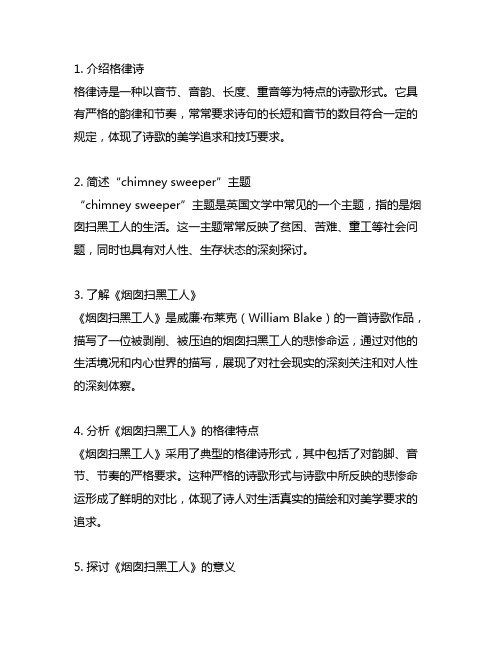
1. 介绍格律诗格律诗是一种以音节、音韵、长度、重音等为特点的诗歌形式。
它具有严格的韵律和节奏,常常要求诗句的长短和音节的数目符合一定的规定,体现了诗歌的美学追求和技巧要求。
2. 简述“chimney sweeper”主题“chimney sweeper”主题是英国文学中常见的一个主题,指的是烟囱扫黑工人的生活。
这一主题常常反映了贫困、苦难、童工等社会问题,同时也具有对人性、生存状态的深刻探讨。
3. 了解《烟囱扫黑工人》《烟囱扫黑工人》是威廉·布莱克(William Blake)的一首诗歌作品,描写了一位被剥削、被压迫的烟囱扫黑工人的悲惨命运,通过对他的生活境况和内心世界的描写,展现了对社会现实的深刻关注和对人性的深刻体察。
4. 分析《烟囱扫黑工人》的格律特点《烟囱扫黑工人》采用了典型的格律诗形式,其中包括了对韵脚、音节、节奏的严格要求。
这种严格的诗歌形式与诗歌中所反映的悲惨命运形成了鲜明的对比,体现了诗人对生活真实的描绘和对美学要求的追求。
5. 探讨《烟囱扫黑工人》的意义《烟囱扫黑工人》作为一首反映社会现实的诗歌作品,具有深刻的社会意义。
它不仅反映了当时英国社会的阶级分化和童工问题,也成为了对当时社会现状的批判和对人性、尊严的呼吁。
也作为一种优秀的格律诗形式,为诗歌创作和美学追求提供了一个典范。
6. 总结《烟囱扫黑工人》是一首具有深刻社会意义和优秀诗歌形式的诗歌作品。
通过对这首诗歌的分析和探讨,可以更好地理解格律诗的特点和社会意义,也可以更深入地认识当时英国社会的现实问题和人文关怀。
希望通过对这样优秀的文学作品的研究和传播,能够激发人们对文学艺术的兴趣和对社会问题的关注,推动人文精神的发展和人类文明的进步。
7. 深入对“烟囱扫黑工人”主题的探讨“烟囱扫黑工人”主题在英国文学中占据重要地位,它不仅仅是一种对贫困、苦难、童工等社会问题的反映,更是对人性、尊严、平等的深刻探讨。
格律诗作为一种形式严谨的诗歌形式,被用来表达这些深刻的思想和情感。
London--William Blake鉴赏

英语诗歌赏析
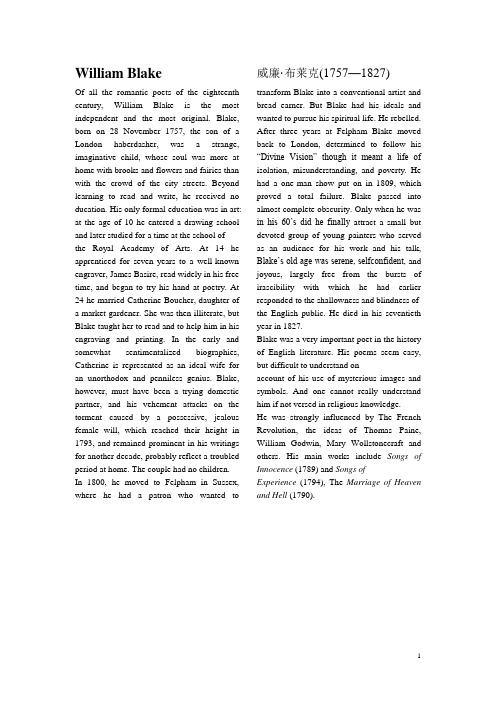
William Blake 威廉·布莱克(1757—1827)Of all the romantic poets of the eighteenth century, William Blake is the most independent and the most original. Blake, born on 28 November 1757, the son of a London haberdasher, was a strange, imaginative child, whose soul was more at home with brooks and flowers and fairies than with the crowd of the city streets. Beyond learning to read and write, he received no ducation. His only formal education was in art: at the age of 10 he entered a drawing school and later studied for a time at the school ofthe Royal Academy of Arts. At 14 he apprenticed for seven years to a well-known engraver, James Basire, read widely in his free time, and began to try his hand at poetry. At24 he married Catherine Boucher, daughter ofa market gardener. She was then illiterate, but Blake taught her to read and to help him in his engraving and printing. In the early and somewhat sentimentalized biographies, Catherine is represented as an ideal wife for an unorthodox and penniless genius. Blake, however, must have been a trying domestic partner, and his vehement attacks on the torment caused by a possessive, jealous female will, which reached their height in 1793, and remained prominent in his writings for another decade, probably reflect a troubled period at home. The couple had no children.In 1800, he moved to Felpham in Sussex, where he had a patron who wanted to transform Blake into a conventional artist and bread earner. But Blake had his ideals and wanted to pursue his spiritual life. He rebelled. After three years at Felpham Blake moved back to London, determined to follow his “Divine Vision” though it meant a life of isolation, misunderstanding, and poverty. He had a one-man show put on in 1809, which proved a total failure. Blake passed into almost complete obscurity. Only when he was in his 60’s did he finally attract a small but devoted group of young painters who served as an audience for his work and his talk, Blake’s old age was serene, selfconfident, and joyous, largely free from the bursts of irascibility with which he had earlier responded to the shallowness and blindness of the English public. He died in his seventieth year in 1827.Blake was a very important poet in the history of English literature. His poems seem easy, but difficult to understand onaccount of his use of mysterious images and symbols. And one cannot really understand him if not versed in religious knowledge.He was strongly influenced by The French Revolution, the ideas of Thomas Paine, William Godwin, Mary Wollstonecraft and others. His main works include Songs of Innocence (1789) and Songs ofExperience (1794), The Marriage of Heaven and Hell (1790).London1I wander thro 2 each charter’d 3 street,Near where the charter’d Thames 4 does flow,And mark 5 in every face I meetMarks of weakness, marks of woe.In every 6 cry of every Man,In every Infant’s cry of fear,In every voice, in every ban, 7The mind-forg’d manacles 8 I hear.How the chimney-sweeper’s 9 cryEvery blackning 10 church appalls; 11And the hapless Soldier’s sighRuns in blood down Palace walls. 12But most 13 thro’ midnight streets I hearHow the youthful Harlot’s curseBlasts 14 the new-born Infant’s tear,And blights 15 with plagues 16 the Marriage hearse. 17 注释1. “London”: from Songs of Experience2. thro’: through3. charter’d: chartered, 指享有专利权的大商人或大公司所独占的4. Thames: 泰晤士河5. mark: notice6. every: 具体地从成人和婴儿、话语和法令的角度描绘伦敦的苦难7. ban: 禁令8. mind-forg’d manacles: 指用英国统治阶级思想铸成的镣铐,-forg’d: -forged9. chimney-sweeper: 扫烟囱者10. black’ning: blackening11. appalls: be surprised12. And the hapless soldier’s sigh / Runs in blood down palace walls:诗人听到不幸士兵的叹息,仿佛看到他们的鲜血正从王宫的墙壁上流下来。
The Chimney Sweeper
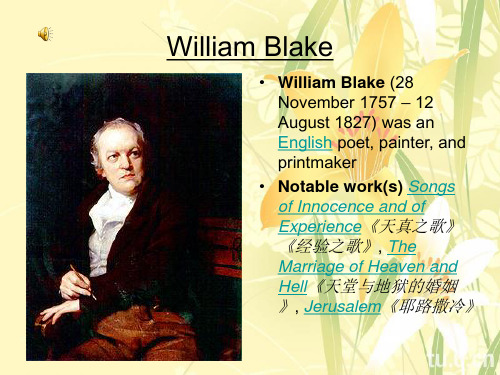
• There is a higher state of understanding the songs of experience. In this case, it is an expression on the poet’s view of the political issue dealing with chimney sweepers that dominates the poem. It shows plight of the majority of the chimney sweepers in the cities of England, and while one endorses hope and the other bitterness, the reader must acknowledge that something needs to be done to improve life for these children.
Thanks for your attention!
The appreciation of the chimney sweeper
• In Songs of Experience, the child in ―The Chimney Sweeper‖ understands that he is a victim and tells the observer (most likely the Bard in the ―Introduction‖ to Experience) who sees the ―little black thing‖ in the snow weeping. Clothing him ―in the clothes of death‖ refers to his life as a social outcast and his being destined to an early death because of the working and living conditions of his profession. However, his parents believe that they have done no harm and have ―gone to praise God and his priest and king‖. This is not only a criticism of the parents who sell their children into this life but of the Church of England and the government for condoning the ill treatment of these chimney sweepers. He also seems to be criticizing God himself, who seems so cruel for allowing those who practice this treatment to go unpunished
英国文学作品英汉对照
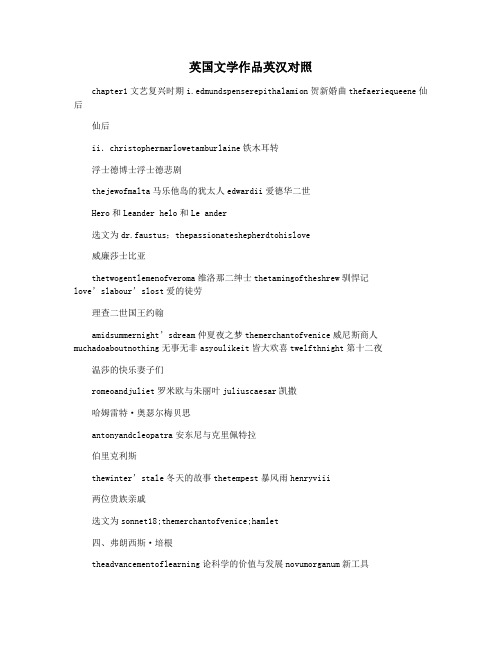
英国文学作品英汉对照chapter1文艺复兴时期i.edmundspenserepithalamion贺新婚曲thefaeriequeene仙后仙后ii.christophermarlowetamburlaine铁木耳转浮士德博士浮士德悲剧thejewofmalta马乐他岛的犹太人edwardii爱德华二世Hero和Leander helo和Le ander选文为dr.faustus;thepassionateshepherdtohislove威廉莎士比亚thetwogentlemenofveroma维洛那二绅士thetamingoftheshrew驯悍记love’slabour’slost爱的徒劳理查二世国王约翰amidsummernight’sdream仲夏夜之梦themerchantofvenice威尼斯商人muchadoaboutnothing无事无非asyoulikeit皆大欢喜twelfthnight第十二夜温莎的快乐妻子们romeoandjuliet罗米欧与朱丽叶juliuscaesar凯撒哈姆雷特·奥瑟尔梅贝思antonyandcleopatra安东尼与克里佩特拉伯里克利斯thewinter’stale冬天的故事thetempest暴风雨henryviii两位贵族亲戚选文为sonnet18;themerchantofvenice;hamlet四、弗朗西斯·培根theadvancementoflearning论科学的价值与发展novumorganum新工具亨利五世标志的历史新亚特兰蒂斯法律格言thelearningreadinguponthestatuteofuses法令使用读书选文ofstudiesv、约翰登theelegiesandsatires挽歌与十四行诗thesongsandsonnets歌谣与十四行诗holysonnets圣十四行诗啊,让我们把圣父的赞美诗献给圣父;临终前的骄傲vi.johnmiltonparadise失去了天堂paradise失去了天堂Samsonagonists Samson Lycidas Lycidas Areopagatica关于新闻自由chapter2新古典主义时期i.johnbunyan朝圣者之旅graceaboundingtothechiefofsinners罪人头目的赫免thelifeanddeathofmr.badman 拜德门先生生死录theholywar圣战从朝圣者的长途跋涉中ii.alexanderpope邓西亚集团愚蠢的史诗anessayoncriticism论批评therapeofthelock夺发记选文anessayoncriticism三、敌人robinsoncrusoe鲁宾逊漂流记captainsingleton辛立顿船长mollflanders莫尔弗兰德斯coloneljack杰克上校罗克萨娜·罗克萨娜鼠疫年日记选文robinsoncrusoe四、乔纳森·斯威夫特·阿塔雷乌布桶形传球thebattleofthebooks书籍的战斗gulliver’stravels格列弗游记从德拉皮尔的书信《格列佛的故事》中得到的一点建议v.henryfielding悲剧中的悲剧thehistoricalregisterfortheyear17361736历史年鉴约瑟夫·安德鲁斯和他的朋友的冒险史。
Analysis of The Chimney Sweeper
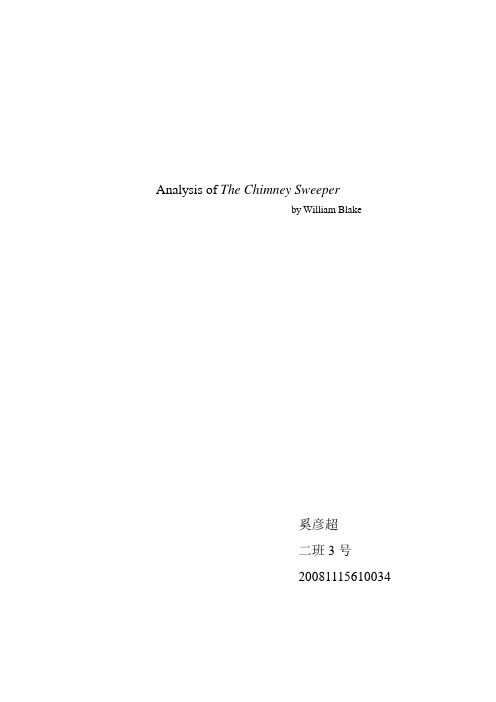
Analysis of The Chimney Sweeperby William Blake奚彦超二班3号20081115610034Analysis of The Chimney SweeperWilliam Blake wrote "The Chimney Sweeper" of "Songs of Innocence" in 1789. In the next to last line of the first stanza, the cry "'weep! 'weep! 'weep! 'weep!" is the child's attempt at saying "Sweep! Sweep!," which was the chimney sweeper's street cry. This poem shows that the children have a very positive outlook on life. They make the best of their lives and do not fear death.This is quite the opposite in it's companion poem in "Songs of Experience" which was written in 1794. In this poem, the child blames his parents for putting him in the position he was in. He is miserable in his situation and he also blames "God & his Priest & King". This point of view is different from that of its companion poem because the chimney sweeper has been influenced by society and has an "experienced" point of view.The poem “The Chimney Sweeper,” in both Songs of Innocence, protests the living conditions, working conditions, and the overall treatment of young chimney sweeps in the cities of England. Martin Nurmi discusses the plight of the chimney sweep extensively in his essay “Fact and Symbol in …The Chimney Sweeper.‟” In 1788, there was an attempt to pass an act to improve the treatment and working conditions of these young children. This would have made many people, including Blake, aware of the lives that these chimney sweeps would live. For instance, they slept in cellars on bags of the soot that they had swept (Nurmi 17), and they were poorly fed and clothed. They would sweep the chimneys naked so their masters would not have to replace clothing that would have been ruined in the chimneys, and they were rarely bathed. Those who were not killed by fires in chimneys usually died early anyway of either respiratory problems or cancer of the scrotum. Sweeping chimneys also left children with ankles and spines deformed and twisted kneecaps from climbing up chimneys that were about nine inches in diameter (Nurmi 16). Many people viewed them as subhuman creatures and not a part of human society.In Songs of Innocence, Blake features in “The Chimney Sweeper” innocence represented by the speaker (the slightly older chimney sweep), Tom, and all the other sweeps. This innocence is exploited and oppressed, and those who are being exploited are unaware of the oppression. The narrator is a chimney sweep whose mother died and was sold by his father at a very young age, as implied by the lines “And my father sold me while my tongue / could scarcely cry …weep weep weep weep!‟” (2-3). The phrase “in soot I sleep” (4), refers to the living conditions of the sweeps. The poem goes on to talk about Tom Dacre and his dream, an important part of the poem. He dreams of the other chimney sweepers being locked in black coffins, symbolic of the lives that the sweeps lived, being poor outcasts in society and having stained unwashed skin and often disfigured bodies. The angel opening the coffins and freeing the sweeps shows the freeing of Tom and other sweeps from the oppressive lifestyle. The reference to being white and the bags being left behind represents a complete escape from this oppression including the soot stained skin and the bags of tools and soot which they carried by day and on which they slept at night. One may also interpret this dream as the coffins representing their literal deaths, andthe chimney sweeps are not free from the oppression until the afterlife. When the angel tells Tom that “if he‟d be a good boy, / He‟d have God for his father and nev er want joy” (19-20), he gives Tom hope that if he is good and does his job, God will be his father and bless him in the next life. The poem concludes with the narrator and his firm belief that if they are obedient and do their duty, all will be well. This last idea expressed emphasizes that he is in the state of innocence and is unaware that he is a victim.For these poems, an understanding of the ideas of one poem, as well as the ideas that it lacks, illuminates the other poem. This gives the reader a different interpretation of the poem than if one of these “The Chimney Sweeper” poems would be read alone. For instance, in Songs of Innocence, the chimney sweeps are offered hope by the outcome of Tom Dacre‟s dream. The narrator offers comfort that no harm or punishment will come to those who obey. Also, Tom is used to illustrate another point. He is originally frightened but later feels “happy and warm” (23), showing that one can experience a certain degree of happiness in the even in the worst of circumstances. These ideas of hope and happiness place further emphasis on the bitterness of the chimney sweep in Songs of Experience. He understands his circumstances and sees no hope of freedom from his oppression. Instead of believing that obedience will prevent punishment, he perceives his current circumstance as a punishment for being happy with his childhood. Also, he does not seem to endorse the Christian idea of having joy in the midst of adversity; he sees little if any reason to be happy in his miserable predicament. In fact, the God that his parents praise seems as cruel as others who allow children to be mistreated in such a way. These examples illustrate how an understanding of the themes of “The Chimney Sweeper” in Songs of Innocence can further illuminate the some of the ideas in Songs of Experience.However, in Songs of Experience, many of the ideas are more realistic in some ways. The chimney sweeper understands that he has been placed in a situation where he is isolated from society and will almost certainly die young because of the hazards of his profession. He mentions established institutions such as the Church of England and the government in the same line with his mother and father, who think they have done no harm. These institutions could have used their power to improve life for the chimney sweeps, but they have made little if any effort to do so. The understanding that this particular sweep possess emphasizes the naivete of the speaker in “The Chimney Sweeper” of Innocence, who believes that e verything will be fine if he is obedient even though his obedience will eventually cost him his own life. The naive child is more accepting of his circumstances, and the narrator himself does not seem to see anyone as being at fault but whose faith in God is a constant source of hope.This example of the “Chimney Sweeper” poems in Songs of Innocence and Songs of Experience illustrates William Blake‟s view that neither naive innocence nor bitter experience is completely accurate. There is a higher state of understanding that includes both innocence and experience. Both are need to complete one another to form the more accurate view. In this case, it is an expression on the poet‟s view of the political issue dealing with chimney sweeps that dominates both poems. Although the viewpoints of each poem are different, both show plight of the majority of the chimney sweepers in the cities of England, and while one endorses hope and the other bitterness, the reader must acknowledge that something needs to be done to improve life for these children."Blake's poetry has the unpleasantness of great poetry," says T.S. Eliot (who has a way ofparodying himself even while making wise observations). The truth in Eliot's remark, for me, has to do not simply with Blake's indictment of conventional churches, governments, artists but with his general, metaphysical defiance toward customary ways of understanding the universe.The "unpleasantness of great poetry," as exemplified by Blake, is rooted in a seductively beautiful process of unbalancing and disrupting. Great poetry gives us elaborately attractive constructions of architecture or music or landscape—while preventing us from settling comfortably into this new and engaging structure, cadence, or terrain. In his Songs of Innocence and Experience, shewing the Two Contrary States of the Human Soul, Blake achieves a binary, deceptively simple version of that splendid "unpleasantness."In particular, the two poems both titled "The Chimney Sweeper" offer eloquent examples of Blake's unsettling art. (One "Chimney Sweeper" poem comes from the Songs of Innocence; the other, from the Songs of Experience.) I can think to myself that the poem in Songs of Innocence is more powerful than the one in Songs of Experience, because the Innocence characters—both the "I" who speaks and "little Tom Dacre"—provide, in their heartbreaking extremes of acceptance, the more devastating indictment of social and economic arrangements that sell and buy children, sending them to do crippling, fatal labor.By that light, the Experience poem entitled "The Chimney Sweeper," explicit and accusatory, can seem a lesser work of art. The Innocence poem is implicit and ironic. Its delusional or deceptive Angel with a bright key exposes religion as exploiting the credulous children, rather than protecting them or rescuing them. The profoundly, utterly "innocent" speaker provides a subversive drama.Does the naked, declarative quality of the Experience poem sharpen my understanding of the Innocence poem? Does the pairing hold back or forbid my understanding's tendency to become self-congratulatory or pleasantly resolved? It is in the nature of William Blake's genius to make such questions not just literary but moral.Reference"William Blake Page", The Arkansas School for Mathematics, Sciences, & the Arts /。
试谈威廉·布莱克两首短诗《扫烟囱的孩子》中的艺术特色
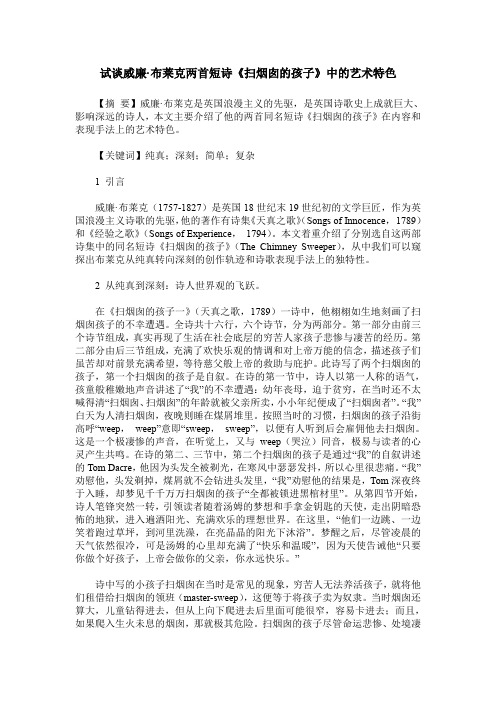
试谈威廉·布莱克两首短诗《扫烟囱的孩子》中的艺术特色【摘要】威廉·布莱克是英国浪漫主义的先驱,是英国诗歌史上成就巨大、影响深远的诗人,本文主要介绍了他的两首同名短诗《扫烟囱的孩子》在内容和表现手法上的艺术特色。
【关键词】纯真;深刻;简单;复杂1 引言威廉·布莱克(1757-1827)是英国18世纪末19世纪初的文学巨匠,作为英国浪漫主义诗歌的先驱,他的著作有诗集《天真之歌》(Songs of Innocence,1789)和《经验之歌》(Songs of Experience,1794)。
本文着重介绍了分别选自这两部诗集中的同名短诗《扫烟囱的孩子》(The Chimney Sweeper),从中我们可以窥探出布莱克从纯真转向深刻的创作轨迹和诗歌表现手法上的独特性。
2 从纯真到深刻:诗人世界观的飞跃。
在《扫烟囱的孩子一》(天真之歌,1789)一诗中,他栩栩如生地刻画了扫烟囱孩子的不幸遭遇。
全诗共十六行,六个诗节,分为两部分。
第一部分由前三个诗节组成,真实再现了生活在社会底层的穷苦人家孩子悲惨与凄苦的经历。
第二部分由后三节组成,充满了欢快乐观的情调和对上帝万能的信念,描述孩子们虽苦却对前景充满希望,等待慈父般上帝的救助与庇护。
此诗写了两个扫烟囱的孩子,第一个扫烟囱的孩子是自叙。
在诗的第一节中,诗人以第一人称的语气,孩童般稚嫩地声音讲述了“我”的不幸遭遇:幼年丧母,迫于贫穷,在当时还不太喊得清“扫烟囱、扫烟囱”的年龄就被父亲所卖,小小年纪便成了“扫烟囱者”。
“我”白天为人清扫烟囱,夜晚则睡在煤屑堆里。
按照当时的习惯,扫烟囱的孩子沿街高呼“weep,weep”意即“sweep,sweep”,以便有人听到后会雇佣他去扫烟囱。
这是一个极凄惨的声音,在听觉上,又与weep(哭泣)同音,极易与读者的心灵产生共鸣。
在诗的第二、三节中,第二个扫烟囱的孩子是通过“我”的自叙讲述的Tom Dacre,他因为头发全被剃光,在寒风中瑟瑟发抖,所以心里很悲痛。
扫烟囱的小孩2
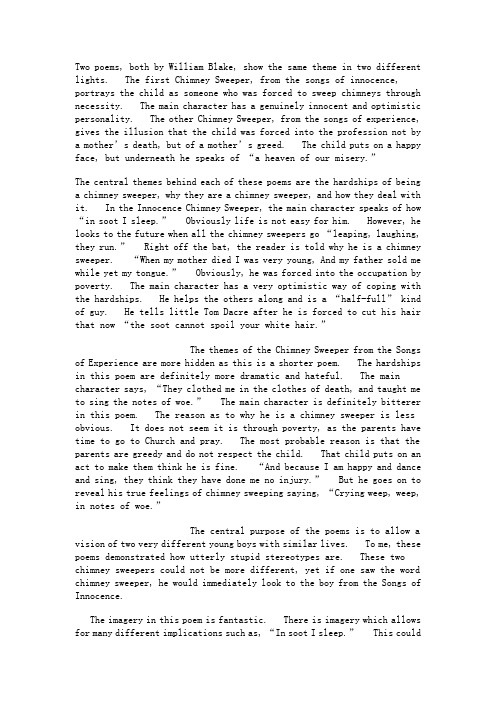
Two poems, both by William Blake, show the same theme in two different lights. The first Chimney Sweeper, from the songs of innocence, portrays the child as someone who was forced to sweep chimneys through necessity. The main character has a genuinely innocent and optimistic personality. The other Chimney Sweeper, from the songs of experience, gives the illusion that the child was forced into the profession not by a mother’s death, but of a mother’s greed. The child puts on a happy face, but underneath he speaks of “a heaven of our misery.”The central themes behind each of these poems are the hardships of being a chimney sweeper, why they are a chimney sweeper, and how they deal with it. In the Innocence Chimney Sweeper, the main character speaks of how “in soot I sleep.” Obviously life is not easy for him. However, he looks to the future when all the chimney sweepers go “leaping, laughing, they run.” Right off the bat, the reader is told why he is a chimney sweeper. “When my mother died I was very young, And my father sold me while yet my tongue.” Obviously, he was forced into the occupation by poverty. The main character has a very optimistic way of coping with the hardships. He helps the others along and is a “half-full” kind of guy. He tells little Tom Dacre after he is forced to cut his hair that now “the soot cannot spoil your white hair.”The themes of the Chimney Sweeper from the Songs of Experience are more hidden as this is a shorter poem. The hardships in this poem are definitely more dramatic and hateful. The main character says, “They clothed me in the clothes of death, and taught me to sing the notes of woe.” The main character is definitely bitterer in this poem. The reason as to why he is a chimney sweeper is less obvious. It does not seem it is through poverty, as the parents have time to go to Church and pray. The most probable reason is that the parents are greedy and do not respect the child. That child puts on an act to make them think he is fine. “And becaus e I am happy and dance and sing, they think they have done me no injury.” But he goes on to reveal his true feelings of chimney sweeping saying, “Crying weep, weep, in notes of woe.”The central purpose of the poems is to allow a vision of two very different young boys with similar lives. To me, these poems demonstrated how utterly stupid stereotypes are. These two chimney sweepers could not be more different, yet if one saw the word chimney sweeper, he would immediately look to the boy from the Songs of Innocence.The imagery in this poem is fantastic. There is imagery which allows for many different implications such as, “In soot I sleep.” This could mean that the boy didn’t have any other clothes and had to sleep in his blackened clothes, or it could mean that he was so tired he actually fellasleep on the job. More imagery is the use of names. In the Songs of Innocence poem, names such as Tom, Dick, and Joe are used because the boy is a lighthearted and genuinely fun person to be around. However, that poem’s darker twin, the Songs of Experience poem lacked any names whatsoever. The structure of imagery is definitely contrasting imagery. This contrast is not so much seen in the individual poems, but in a comparison of the two.Denotation is the dictionary definition of aword. Connotation involves the baggage the word accompanies. The line in which the boy is yelling “’weep! ‘weep!” is a great example of how there exist differences between connotation and denotation. This is just a boy calling for work asking if anybody needs their chimneyswept. However, this implies with the connotative meaning that this is a poor little boy covered in soot from a poor family who wants work just so he can have dinner. Big difference, eh?James Blake is a master poet. He not only provides great contrast in a poem, but provides excellent contrast between two very different poems. The imagery is spectacular and the purpose of this poem has survived almost 250 years.。
欧美文学名篇选读参考答案
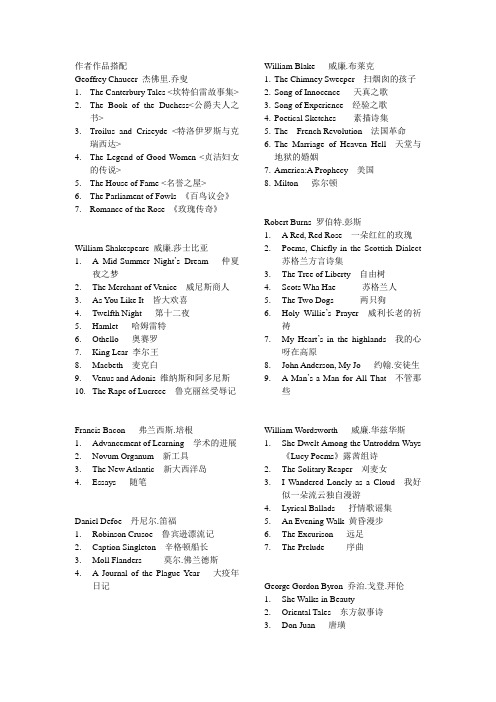
作者作品搭配Geoffrey Chaucer 杰佛里.乔叟1.The Canterbury Tales <坎特伯雷故事集>2.The Book of the Duchess<公爵夫人之书>3.Troilus and Criseyde <特洛伊罗斯与克瑞西达>4.The Legend of Good Women <贞洁妇女的传说>5.The House of Fame <名誉之屋>6.The Parliament of Fowls 《百鸟议会》7.Romance of the Rose 《玫瑰传奇》William Shakespeare 威廉.莎士比亚1. A Mid-Summer Night’s Dream 仲夏夜之梦2.The Merchant of Venice 威尼斯商人3.As You Like It 皆大欢喜4.Twelfth Night 第十二夜5.Hamlet 哈姆雷特6.Othello 奥赛罗7.King Lear 李尔王8.Macbeth 麦克白9.Venus and Adonis 维纳斯和阿多尼斯10.The Rape of Lucrece 鲁克丽丝受辱记Francis Bacon 弗兰西斯.培根1.Advancement of Learning 学术的进展2.Novum Organum 新工具3.The New Atlantic 新大西洋岛4.Essays 随笔Daniel Defoe 丹尼尔.笛福1.Robinson Crusoe 鲁宾逊漂流记2.Caption Singleton 辛格顿船长3.Moll Flanders 莫尔.佛兰德斯4. A Journal of the Plague Year 大疫年日记William Blake 威廉.布莱克1.The Chimney Sweeper 扫烟囱的孩子2.Song of Innocence 天真之歌3.Song of Experience 经验之歌4.Poetical Sketches 素描诗集5.The French Revolution 法国革命6.The Marriage of Heaven Hell 天堂与地狱的婚姻7.America:A Prophecy 美国ton 弥尔顿Robert Burns 罗伯特.彭斯1. A Red, Red Rose 一朵红红的玫瑰2.Poems, Chiefly in the Scottish Dialect苏格兰方言诗集3.The Tree of Liberty 自由树4.Scots Wha Hae 苏格兰人5.The Two Dogs 两只狗6.Holy Willie’s Prayer 威利长老的祈祷7.My Heart’s in the highlands 我的心呀在高原8.John Anderson, My Jo 约翰.安徒生9. A Man’s a Man for All That 不管那些William Wordsworth 威廉.华兹华斯1.She Dwelt Among the Untroddrn Ways《Lucy Poems》露茜组诗2.The Solitary Reaper 刈麦女3.I Wandered Lonely as a Cloud 我好似一朵流云独自漫游4.Lyrical Ballads 抒情歌谣集5.An Evening Walk 黄昏漫步6.The Excurison 远足7.The Prelude 序曲George Gordon Byron 乔治.戈登.拜伦1.She Walks in Beauty2.Oriental Tales 东方叙事诗3.Don Juan 唐璜4.Childe Harold’s Pilgrimage 恰尔德.哈罗德游记5.The Prisoner of Chillon 锡雍的囚徒6.Manfred 曼弗雷德7.Cain 该隐8.The Vision of Judgment 审判的幻境9.The Age of Bronze 青铜世纪Edgar Allan Poe 埃德加.爱伦.坡1.To Helen 致海伦2.The Raven 乌鸦3.Annabel Lee 安娜贝尔.李4.The Bells 钟声5.The Fall of the House of Usher 厄舍古宅的倒塌Walt Whitman 瓦尔特.惠特曼1.O Caption!My Caption!A,船长!我的船长!Emily Dickinson 埃米莉.狄更生1.I Died for Beauty 为美而死2.Success 成功3.I’m Nobody 我是小人物Jane Austen 简.奥斯丁1.Pride and Prejudice 傲慢与偏见2.Sense and Sensibility 理智与情感3.Mansfield Park 曼斯菲尔德公园4.Emma 爱玛5.Northanger Abbey 诺森觉寺6.Persuasion 劝导Charlotte Bronte 夏洛蒂.勃朗特1.Jane Eyre 简.爱2.Shirley 雪莉3.The Professor 教授4.Villette 维莱特Washington Irving 华盛顿.欧文1.Rip Van Winkle 瑞普.凡.温克尔2.The Legend of Sleepy Hollow 睡谷传奇3. A History of New YorkNathaniel Hawthorne 纳撒尼尔.霍桑1.The Scarlet Letter 红字2.Mosses from an Old Manse 古宅青苔3.The House of the Seven Gables 七个尖角阁的房子4.The Marble Faun 大理石雕像5.The Blithedale Romance 福谷传奇William Butler Yeats 威廉.巴特勒.叶芝1.The Second Coming 第二次圣临2.The Lake Isle of Innisfree 茵尼斯弗利岛3.When You Are Old 当你老了4.Sailing to Byzantium 驶向拜占庭5.The Winding Stair 盘旋的楼梯William Faulkner 威廉.福克纳1. A Rose For Emily 献给埃米莉的玫瑰2.The Sound and the Fury 喧嚣与骚动3.As I Lay Dying 在我弥留之际4.Light in August 八月之光5.Absalom,Absalom!押沙龙,押沙龙诗歌翻译和赏析Sonnet 18 William Shakespeare 威廉.莎士比亚Shall I compare thee to a summer's day?Thou art more lovely and more temperate.Rough winds do shake the darling buds of May,And summer's lease hath all too short a date.Sometime too hot the eye of heaven shines,And often is his gold complexion dimmed;And every fair from fair sometime declines,By chance or nature's changing course untrimmed;But thy eternal summer shall not fade,Nor lose possession of that fair thou ow'st;Nor shall Death brag thou wander'st in his shade,When in eternal lines to time thou grow'st.So long as men can breathe, or eyes can see,So long lives this, and this gives life to thee.译文我怎么能够将你比作夏天?你比夏天更美丽温婉。
The Chimney Sweeper

The Chimney SweeperWhen my mother died I was very young,And my father sold me while yet my tongue,Could scarcely cry weep weep weep weep.So your chimneys I sweep and in soot I sleep.Theres little Tom Dacre. who cried when his head, That curl'd like a lambs back, was shav'd, so I said, Hush Tom never mind it, for when your head's bare, You know that the soot cannot spoil your white hair.And so he was quiet, and that very night,As Tom was a sleeping he had such a sight,That thousands of sweepers Dick, Joe, Ned and Jack Were all of them lock'd up in coffins of black,And by came an Angel who had a bright keyAnd he open'd the coffins and set them all free.Then down a green plain leaping laughing they run And wash in a river and shine in the Sun.Then naked and white, all their bags left behind,They rise upon clouds, and sport in the wind.And the Angel told Tom if he'd be a good boy.He'd have God for his father and never want joy.And so Tom awoke and we rose in the darkAnd got with our bags and our brushes to work.Tho' the morning was cold, Tom was happy and warm, So if all do their duty, they need not fear harm.。
长篇英文诗歌朗诵大全加翻译
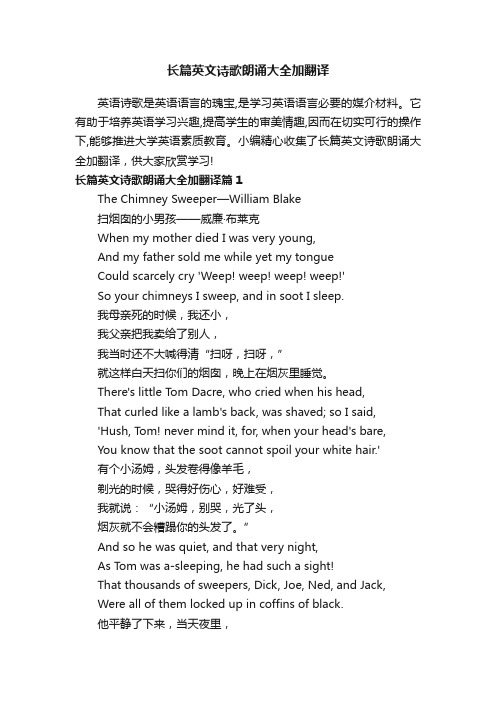
长篇英文诗歌朗诵大全加翻译英语诗歌是英语语言的瑰宝,是学习英语语言必要的媒介材料。
它有助于培养英语学习兴趣,提高学生的审美情趣,因而在切实可行的操作下,能够推进大学英语素质教育。
小编精心收集了长篇英文诗歌朗诵大全加翻译,供大家欣赏学习!长篇英文诗歌朗诵大全加翻译篇1The Chimney Sweeper—William Blake扫烟囱的小男孩——威廉·布莱克When my mother died I was very young,And my father sold me while yet my tongueCould scarcely cry 'Weep! weep! weep! weep!'So your chimneys I sweep, and in soot I sleep.我母亲死的时候,我还小,我父亲把我卖给了别人,我当时还不大喊得清“扫呀,扫呀,”就这样白天扫你们的烟囱,晚上在烟灰里睡觉。
There's little Tom Dacre, who cried when his head,That curled like a lamb's back, was shaved; so I said,'Hush, T om! never mind it, for, when your head's bare,You know that the soot cannot spoil your white hair.'有个小汤姆,头发卷得像羊毛,剃光的时候,哭得好伤心,好难受,我就说:“小汤姆,别哭,光了头,烟灰就不会糟蹋你的头发了。
”And so he was quiet, and that very night,As Tom was a-sleeping, he had such a sight!That thousands of sweepers, Dick, Joe, Ned, and Jack,Were all of them locked up in coffins of black.他平静了下来,当天夜里,汤姆睡着了,梦见了这样的情景,迪克、乔、南德,杰克等千千万万个扫烟囱小孩统统被锁进了黑棺材。
William Blake- The Chimney Sweeper(The Song of Innocence)
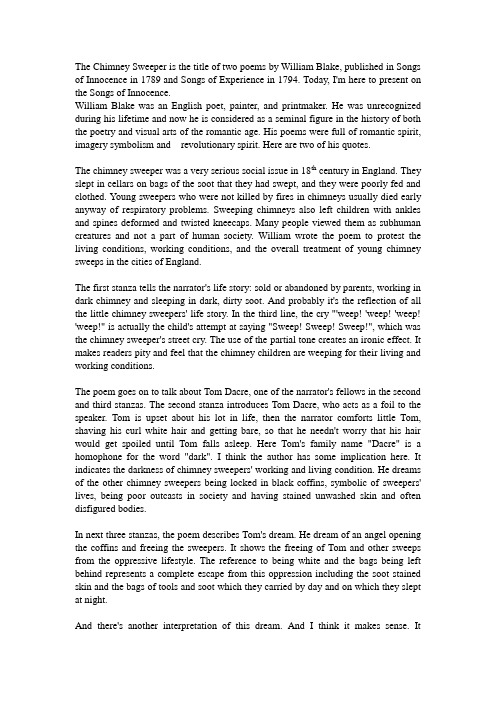
The Chimney Sweeper is the title of two poems by William Blake, published in Songs of Innocence in 1789 and Songs of Experience in 1794. Today, I'm here to present on the Songs of Innocence.William Blake was an English poet, painter, and printmaker. He was unrecognized during his lifetime and now he is considered as a seminal figure in the history of both the poetry and visual arts of the romantic age. His poems were full of romantic spirit, imagery symbolism and revolutionary spirit. Here are two of his quotes.The chimney sweeper was a very serious social issue in 18th century in England. They slept in cellars on bags of the soot that they had swept, and they were poorly fed and clothed. Y oung sweepers who were not killed by fires in chimneys usually died early anyway of respiratory problems. Sweeping chimneys also left children with ankles and spines deformed and twisted kneecaps. Many people viewed them as subhuman creatures and not a part of human society. William wrote the poem to protest the living conditions, working conditions, and the overall treatment of young chimney sweeps in the cities of England.The first stanza tells the narrator's life story: sold or abandoned by parents, working in dark chimney and sleeping in dark, dirty soot. And probably it's the reflection of all the little chimney sweepers' life story. In the third line, the cry "'weep! 'weep! 'weep! 'weep!" is actually the child's attempt at saying "Sweep! Sweep! Sweep!", which was the chimney sweeper's street cry. The use of the partial tone creates an ironic effect. It makes readers pity and feel that the chimney children are weeping for their living and working conditions.The poem goes on to talk about Tom Dacre, one of the narrator's fellows in the second and third stanzas. The second stanza introduces Tom Dacre, who acts as a foil to the speaker. Tom is upset about his lot in life, then the narrator comforts little Tom, shaving his curl white hair and getting bare, so that he needn't worry that his hair would get spoiled until Tom falls asleep. Here Tom's family name "Dacre" is a homophone for the word "dark". I think the author has some implication here. It indicates the darkness of chimney sweepers' working and living condition. He dreams of the other chimney sweepers being locked in black coffins, symbolic of sweepers' lives, being poor outcasts in society and having stained unwashed skin and often disfigured bodies.In next three stanzas, the poem describes Tom's dream. He dream of an angel opening the coffins and freeing the sweepers. It shows the freeing of Tom and other sweeps from the oppressive lifestyle. The reference to being white and the bags being left behind represents a complete escape from this oppression including the soot stained skin and the bags of tools and soot which they carried by day and on which they slept at night.And there's another interpretation of this dream. And I think it makes sense. Itinterpret the dream as the coffins representing their literal deaths, and the chimney sweepers can only get freed from the oppression until their afterlife.When the angel tells Tom that “if he’d be a good boy, He’d have God for his father and never want joy”, he gives Tom hope that if he is good and does his job, God will be his father and bless him in the next life.Beside the image of the Angel is quite ironic too. The bright angel with a bright key exposes religion as exploiting the credulous children, rather than protecting them or rescuing them.To conclude, in this poem, the chimney sweepers are offered hope by the outcome of Tom Dacre’s dream. The narrator offers comfort that if they are obedient and do their duty, all will be well. Also, Tom is used to illustrate another point. He is originally frightened but later feels “happy and warm”, showin g that he is in the state of innocence and is unaware that he is a victim.。
William_Blake_the chimney sweeper 译文及解析
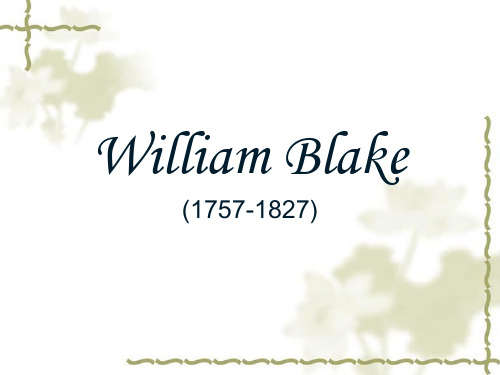
the political and religious leaders, represented by God, Priest and King, are hypocritically pious. They maintain a sumptuous life, but ignore the poverty-stricken groups. Through the child’s simple statement, the poet intends to attack them for their indifference and ruthlessness.
Songs of Experience (1794)
A much mature work Show the sufferings of the miserable It marks the poet’s progress in his outlook on life. To him, experience had brought a fuller sense of the power of evil, and of the great misery and pain of the people57-1827)
Major Literary Works
Songs
of Innocence (1789): present a happy and innocent world, though with its evils and sufferings Songs of Experience (1794): present a world of misery, poverty, disease, war and repression with a melancholy tone
the chimney sweeper韵脚
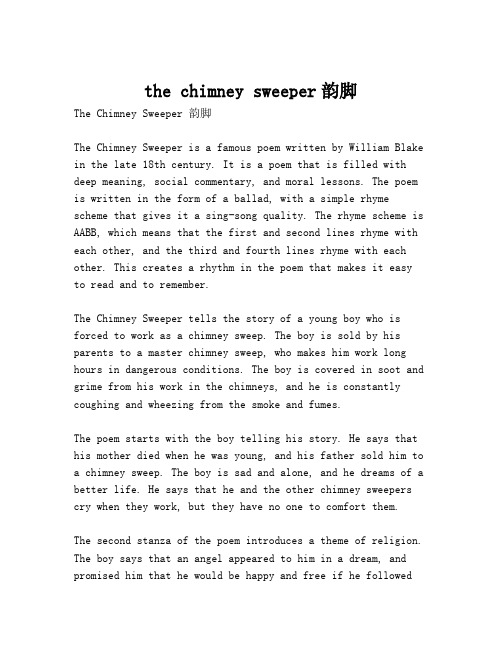
the chimney sweeper韵脚The Chimney Sweeper 韵脚The Chimney Sweeper is a famous poem written by William Blake in the late 18th century. It is a poem that is filled with deep meaning, social commentary, and moral lessons. The poem is written in the form of a ballad, with a simple rhyme scheme that gives it a sing-song quality. The rhyme scheme is AABB, which means that the first and second lines rhyme with each other, and the third and fourth lines rhyme with each other. This creates a rhythm in the poem that makes it easy to read and to remember.The Chimney Sweeper tells the story of a young boy who is forced to work as a chimney sweep. The boy is sold by his parents to a master chimney sweep, who makes him work long hours in dangerous conditions. The boy is covered in soot and grime from his work in the chimneys, and he is constantly coughing and wheezing from the smoke and fumes.The poem starts with the boy telling his story. He says that his mother died when he was young, and his father sold him to a chimney sweep. The boy is sad and alone, and he dreams of a better life. He says that he and the other chimney sweepers cry when they work, but they have no one to comfort them.The second stanza of the poem introduces a theme of religion. The boy says that an angel appeared to him in a dream, and promised him that he would be happy and free if he followedthe path of righteousness. The angel tells the boy that his sorrows will be over, and he will be like a “lamb” that is free to frolic in the fields.The third stanza of the poem takes on a more political tone. The boy says that he has been taught to be grateful for his situation, and that he should be happy to be a chimney sweep. He says that he has been taught to respect his master, even though his master is cruel and abusive. The boy says that he has been brainwashed by society to accept his fate.The final stanza of the poem returns to the theme of religion. The boy says that he has accepted his fate, and he is nolonger sad or afraid. He says that he knows that he will one day be free, and he will be rewarded in heaven for his suffering. The boy ends the poem by saying that he is happy, and he believes that he will find peace and happiness in death.The Chimney Sweeper is a powerful poem that speaks to the human condition. It highlights the issues of child labor, poverty, and social inequality that were prevalent inBlake’s time, and continue to be relevant today. The poem’s simple rhyme scheme and sing-song quality make it easy to remember, and the powerful themes and moral lessons itcontains make it a classic piece of literature that is still studied and appreciated today.。
扫烟囱的孩子
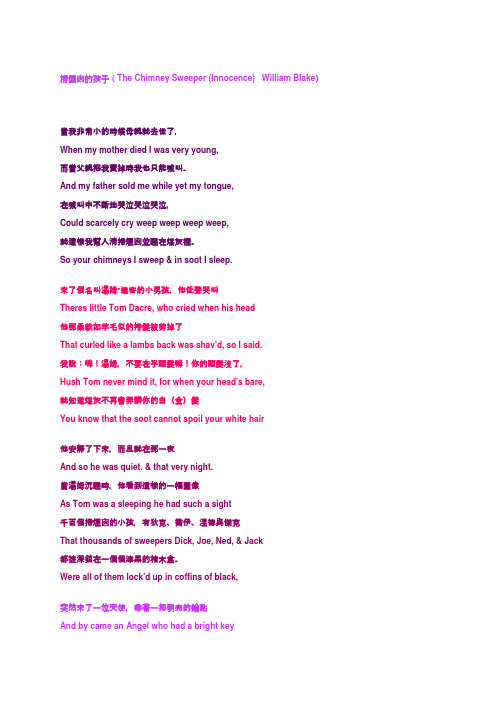
掃煙囪的孩子(The Chimney Sweeper (Innocence) William Blake)當我非常小的時候母親就去世了,When my mother died I was very young,而當父親把我賣掉時我也只能喊叫。
And my father sold me while yet my tongue,在喊叫中不斷地哭泣哭泣哭泣,Could scarcely cry weep weep weep weep,就這樣我幫人清掃煙囪並睡在煤灰裡。
So your chimneys I sweep & in soot I sleep.來了個名叫湯姆•達客的小男孩,他低聲哭叫Theres little Tom Dacre, who cried when his head他那柔軟如羊毛似的捲髮被剪掉了That curled like a lambs back was shav'd, so I said.我說:嗨!湯姆,不要在乎頭髮嘛!你的頭髮沒了,Hush Tom never mind it, for when your head's bare,就知道煤灰不再會弄髒你的白(金)髮You know that the soot cannot spoil your white hair他安靜了下來,而且就在那一夜And so he was quiet. & that very night.當湯姆沉睡時,他看到這樣的一幅圖像As Tom was a sleeping he had such a sight千百個掃煙囪的小孩,有狄克、喬伊、涅德與傑克That thousands of sweepers Dick, Joe, Ned, & Jack都被深鎖在一個個漆黑的棺木盒。
Were all of them lock'd up in coffins of black,突然來了一位天使,帶著一把明亮的鑰匙And by came an Angel who had a bright key打開了棺木盒,讓所有的小孩全然自由And he open'd the coffins & set them all free.置身在翠綠的草原上盡情歡笑盡情雀躍Then down a green plain leaping laughing they run他們在溪流中沐浴著,在陽光下閃耀著And wash in a river and shine in the Sun.他們把工具袋拋在一旁,裸露身體,全身白淨Then naked & white, all their bags left behind.他們在雲間跳躍,在風中嬉鬧They rise upon clouds, and sport in the wind.天使告訴湯姆,如果他是一個乖小孩And the Angel told Tom, if he'd be a good boy,上帝會是他的父親,並且歡樂永不缺He'd have God for his father & never want joy.湯姆醒來,大夥也在黑暗中起床And so Tom awoke and we rose in the dark背上工具袋,帶著掃把一起去工作And got with our bags & our brushes to work.儘管清晨時刻寒意刺骨,湯姆卻快樂又溫暖Tho' the morning was cold, Tom was happy & warm只要完成工作,他們就不再懼怕傷害So if all do their duty, they need not fear harm.參考資料:</poem/the-chimney-sweeper-innocence/><.tw/mallok/Folk/content.asp?post_serial=463>欣賞:這首詩是英國詩人布雷克(William Blake, 1757-1827)在一七八九年所寫的,詩中深刻表達人性關懷的一面。
William Blake’s “London”

a pre-romantic poet
Listen
William Blake’s “London”
chartered, 指享有专利
权的大商人或大公司所独占的 through I wander thro each charter’d street, 我徘徊在每条被独占的街上,
从每个声音里,从每一条禁令 用英国统治阶级思想铸成的镣铐
The mind-forg’d manacles I hear.
都能听到心灵铸的镣铐。
William Blake’s “London”
How the Chimney-sweeper’s cry
听扫烟囱孩子的叫喊
blackening Every blackning church appals; be surprised
most of all But most thro’ midnight streets I hear
但我常听见在深夜的街头
How the youthful Harlot’s curse
年轻妓女不停地诅咒。
William Blake’s “London”
使干枯,指吓得婴儿不敢哭泣
Blasts the new-born Infant’s tear,
Near where the charter’d Thames does flow,
靠近那也被霸占的泰晤士河,
William Blake’s “London”
notice And mark in every face I meet
注意到所遇的每个行人脸上
sadness Marks of weakness, marks of woe.
The Chimney Sweeper
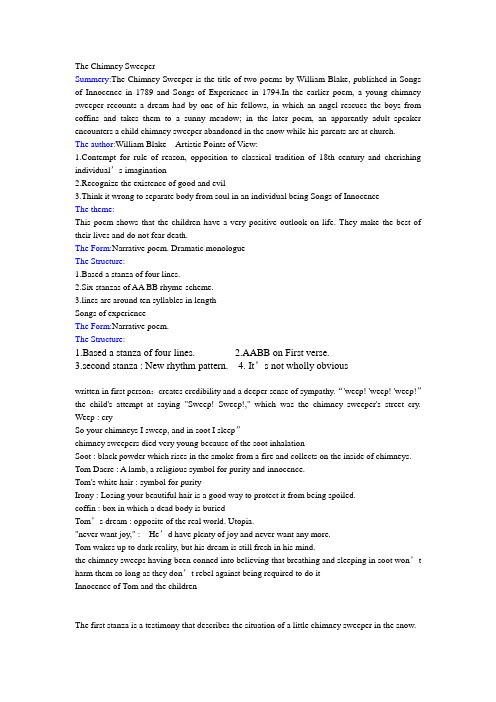
The Chimney SweeperSummery:The Chimney Sweeper is the title of two poems by William Blake, published in Songs of Innocence in 1789 and Songs of Experience in 1794.In the earlier poem, a young chimney sweeper recounts a dream had by one of his fellows, in which an angel rescues the boys from coffins and takes them to a sunny meadow; in the later poem, an apparently adult speaker encounters a child chimney sweeper abandoned in the snow while his parents are at church.The author:William Blake Artistic Points of View:1.Contempt for rule of reason, opposition to classical tradition of 18th century and cherishing individual’s imagination2.Recognize the existence of good and evil3.Think it wrong to separate body from soul in an individual being Songs of InnocenceThe theme:This poem shows that the children have a very positive outlook on life. They make the best of their lives and do not fear death.The Form:Narrative poem. Dramatic monologueThe Structure:1.Based a stanza of four lines.2.Six stanzas of AA BB rhyme-scheme.3.lines are around ten syllables in lengthSongs of experienceThe Form:Narrative poem.The Structure:1.Based a stanza of four lines.2.AABB on First verse.3.second stanza : New rhythm pattern.4. It’s not wholly obviouswritten in first person:creates credibility and a deeper sense of sympathy.“'weep! 'weep! 'weep!”the child's attempt at saying "Sweep! Sweep!," which was the chimney sweeper's street cry. Weep : crySo your chimneys I sweep, and in soot I sleep”chimney sweepers died very young because of the soot inhalationSoot : black powder which rises in the smoke from a fire and collects on the inside of chimneys. Tom Dacre : A lamb, a religious symbol for purity and innocence.Tom's white hair : symbol for purityIrony : Losing your beautiful hair is a good way to protect it from being spoiled.coffin : box in which a dead body is buriedTom’s dream : opposite of the real world. Utopia."never want joy," : He’d have plenty of joy and never want any more.Tom wakes up to dark reality, but his dream is still fresh in his mind.the chimney sweeps having been conned into believing that breathing and sleeping in soot won’t harm them so long as they don’t rebel against being required to do itInnocence of Tom and the childrenThe first stanza is a testimony that describes the situation of a little chimney sweeper in the snow.There is a strong color contrast: black and white.the same child weeping, when he really means to say sweeping .The stanza ends by someone asking him about his parents, which later end up being responsible for this child’s state.In the second and third stanzas, the child explains his situation.adults are showed to be punishing their child for being so happy by doing those things. It is very obvious the sweeper’s feels hate towards his parents for putting him in such sadness.It is clear in the last Stanza that Blake’s criticizing the ChurchThe sweeper’s parents are really no help towards their own child.This makes the reader wonder, if they are worshipping god, the source of good doings, why do they chose to ignore their own child.。
- 1、下载文档前请自行甄别文档内容的完整性,平台不提供额外的编辑、内容补充、找答案等附加服务。
- 2、"仅部分预览"的文档,不可在线预览部分如存在完整性等问题,可反馈申请退款(可完整预览的文档不适用该条件!)。
- 3、如文档侵犯您的权益,请联系客服反馈,我们会尽快为您处理(人工客服工作时间:9:00-18:30)。
The Structure:
Based a stanza of four lines. Rhythm pattern: AABB on First stanza. ABAB on second &third
Features
written in first person:creates credibility and a deeper sense of sympathy.“'weep! 'weep! 'weep!” Blake writes his poems in plain and direct language. His poems often carry the lyric beauty with immense compression of meaning. He distrusts the abstractness and tends to embody his views with visual images. use of simple language serious, somber themes lyrical beauty symbolism mysticism
Because I was happy upon the heath, “因为我喜欢在荒野上嬉戏, And smil'd among the winters snow 在冬天的大雪中也满脸笑意, They clothed me in the clothes of death, 他们就给我穿上丧衣,
William Blake
(1757-1827)
Major Literary Works
Songs
of Innocence (1789): present a happy and innocent world, though with its evils and sufferings Songs of Experience (1794): present a world of misery, poverty, disease, war and repression with a melancholy tone
And taught me to sing the notes of woe. 还教我用悲声唱丧曲。”
And because I am happy & dance & sing, “因为我显得快乐,又唱歌,又跳舞, They think they have done me no injury: 他们就觉得对我的所为无害无虞, And are gone to praise God & his Priest & King, 于是就去赞美牧师、国王和上帝— Who make up a heaven of our misery. 这些人用我们的痛苦成就了一个极乐之地。”
The Chimney Sweeper
Summery: The Chimney Sweeper is the title of two poems by William Blake, published in Songs of Innocence in 1789 and Songs of Experience in 1794.In the earlier poem, a young chimney sweeper recounts a dream had by one of his fellows, in which an angel rescues the boys from coffins and takes them to a sunny meadow; in the later poem, an apparently adult speaker encounters a child chimney sweeper abandoned in the snow while his parents are at church.
Songs of Experience (1794)
A much mature work Show the sufferings of the miserable It marks the poet’s progress in his outlook on life. To him, experience had brought a fuller sense of the power of evil, and of the great misery and pain of the people’s life.
the political and religious leaders, represented by God, Priest and King, are hypocritically pious. They maintain a sumptuous life, but ignore the poverty-stricken groups. Through the child’s simple statement, the poet intends to attack them for their indifference and ruthlessness.
A little black thing among the snow 一个满身污垢的小小身影站在大雪里,
Crying weep, weep, in notes of woe! “扫烟囱!扫烟囱!”他的叫声悲戚! (the child's attempt at saying "Sweep! Sweep!," which was the chimney sweeper's street cry. Weep : cry) Where are thy father & mother? say? “告诉我,你的父母在哪里?” They are both gone up to the church to pray. 他们都去了教堂祷告上帝.
Songs of Innocence(1809)
A lovely volume of poems, presenting a happy and innocent world, though not without its evils and sufferings. However, in “The little black boy” and “The chimney sweeper”, we find racial discrimination and sufferings of the poor.
